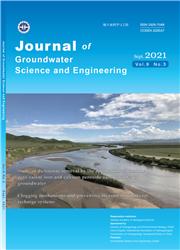Impact of animal manure addition on the weathering of agricultural lime in acidic soils: The agent of carbonate weathering
IF 1.8
4区 地球科学
Q3 WATER RESOURCES
引用次数: 1
Abstract
Fertilization and aglime (agricultural lime) application, as important agricultural activities in acid soil, exert an influence on the fluxes of carbon both between and within ecosystems. Animal manure added to soil can elevate the soil CO2 and release organic acid due to microbial decomposition of the high organic matter content of animal manure. Additionally, the elevated CO2 can accelerate carbonate weathering in alkaline soil, such as lime soil. However, in acidic soil, it is unclear whether the chemical weathering of additive aglime can be quickened by the elevated CO2 due to animal manure addition. Thus, to ascertain the impact of animal manure addition on aglime weathering in acidic soil and to understand the weathering agent of aglime or underlying carbonate in the acidic soil profile, we established two contrasting profiles (control profile and manurial profile) in a cabbage-corn or capsicum-corn rotation in a field experiment site located in the HuaXi district of Guiyang, China, and buried carbonate rock tablets at different depths of soil profiles to calculate the dissolution rate of carbonate rock by monitoring the weights of the tablets. The results indicated that soil CO2 increased due to animal manure addition, but the rate of dissolution of the carbonate rock tablets was reduced, which was attributed to the increase in the pH in acidic soil after animal manure addition because the relationship between the dissolution rate of carbonate rock and soil pH indicated that the weathering rate of carbonate rock was controlled by pH and not by CO2 in acidic soil. Thus, the contribution of H+ ions (mainly exchangeable acid) in acid soil as a weathering agent to the weathering of underlying carbonate (and/or aglime) may lead to the overestimation of the CO2 consumption through chemical weathering at the regional/global scale using hydro-chemical methods.添加动物粪便对酸性土壤中农业石灰风化的影响:碳酸盐风化剂
施肥和施用农业石灰作为酸性土壤中的重要农业活动,对生态系统之间和生态系统内部的碳通量都有影响。添加到土壤中的动物粪便由于微生物分解了动物粪便中的高有机质含量,可以升高土壤CO2并释放有机酸。此外,升高的二氧化碳会加速碱性土壤(如石灰土)中碳酸盐的风化。然而,在酸性土壤中,尚不清楚添加动物粪便引起的CO2升高是否能加速添加剂aglime的化学风化。因此,为了确定添加动物粪便对酸性土壤中aglime风化的影响,并了解aglime或下层碳酸盐在酸性土壤剖面中的风化作用,我们在位于中国贵阳市花溪区的一个田间试验点建立了甘蓝-玉米或辣椒-玉米轮作的两个对比剖面(对照剖面和肥料剖面),并将碳酸盐岩片埋在不同深度的土壤剖面中,通过监测碳酸盐岩片的重量来计算碳酸盐岩的溶解速率。结果表明,添加动物粪便增加了土壤CO2,但碳酸盐岩片的溶解速率降低,这归因于添加动物粪便后酸性土壤中pH的增加,因为碳酸盐岩的溶解速率与土壤pH之间的关系表明碳酸盐岩的风化速率受酸性土壤中的pH控制,而不受CO2控制。因此,酸性土壤中的H+离子(主要是可交换酸)作为风化剂对下层碳酸盐(和/或aglime)风化的贡献可能会导致使用水化学方法在区域/全球范围内通过化学风化高估CO2消耗量。
本文章由计算机程序翻译,如有差异,请以英文原文为准。
求助全文
约1分钟内获得全文
求助全文
来源期刊

Journal of Groundwater Science and Engineering
WATER RESOURCES-
CiteScore
2.80
自引率
9.10%
发文量
308
期刊介绍:
It publishes original, innovative, and integrative research in groundwater science and engineering with a focus on hydrogeology, environmental geology, groundwater resources, agriculture and groundwater, groundwater resources and ecology, groundwater and geologic environment, groundwater circulation, groundwater pollution, groundwater exploitation and utilization, hydrogeological standards and methods, groundwater information science, climate change and groundwater. The Editorial Board is composed of more than sixty world-renowned experts and scholars, 47% of whom are foreign scientists. Up to now, the foreign authors contributed papers are from USA, Japan, Canada, Australia, Russia, Mongolia, Thailand and Vietnam.
 求助内容:
求助内容: 应助结果提醒方式:
应助结果提醒方式:


